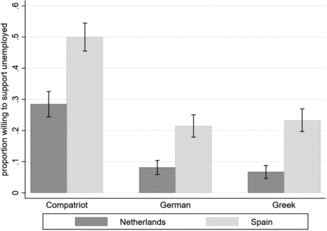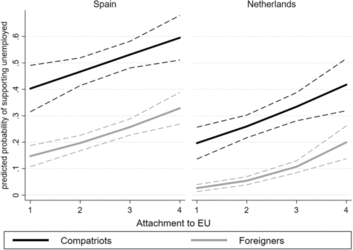Introduction
In the wake of the European sovereign debt crisis, unemployment has soared across the European Union (EU). Consequently, plans to develop Europe-wide unemployment benefits are high on the political agenda. Both the European Commission (2017) and the European Council (Van Rompuy, Reference Van Rompuy2012) have highlighted the need to establish mechanisms of risk sharing in the European Monetary Union to absorb unemployment shocks in the member-states. Several proposals on the table either involve direct payments to European citizens or propose transfers between European member-states (Spath, Reference Spath2016). Such policies are expected to improve macroeconomic stability and ultimately strengthen the democratic legitimacy of European integration (Vandenbroucke et al., Reference Vandenbroucke, Burgoon, Kuhn and Nicoli2018). European unemployment policies would also constitute an important step towards a full-fledged European social union (Vandenbroucke et al., Reference Vandenbroucke, Barnard and De Baere2017).
Which of these plans, if any at all, can be successfully implemented also depends on public opinion. In times of ‘constraining dissensus’, European policymakers increasingly need widespread and stable support from the European public to bring European integration further (Hooghe and Marks, Reference Hooghe and Marks2018). This has triggered scholarly interest in international solidarity within the European Union (Ferrera, Reference Ferrera2017; Lahusen and Grasso, Reference Lahusen and Grasso2018). While there is a growing body of research on public support for international bailouts in the EU (Bechtel et al., Reference Bechtel, Hainmueller and Margalit2014; Kleider and Stoeckel, Reference Kleider and Stoeckel2018; Stoeckel and Kuhn, Reference Stoeckel and Kuhn2018; Verhaegen, Reference Verhaegen2018), the individual basis of support for European unemployment policies has not yet been sufficiently studied. Several authors have analyzed public opinion on the Europeanization of welfare states (Burgoon, Reference Burgoon2009; Beaudonnet, Reference Beaudonnet2013; Ciornei and Recchi, Reference Ciornei and Recchi2017; Hooghe and Verhaegen, Reference Hooghe, Verhaegen, Vandenbroucke, Barnard and De2017), and Gerhards et al., (Reference Gerhards, Lengfeld, Ignacz, Kley and Priem2018) have come to the conclusion that there is widespread support for European social policies. However, these public opinion studies mainly focused on the EU’s role in providing welfare and social security, for example by asking whether citizens think that the EU should offer a decent standard of living for the unemployed (Gerhards et al., Reference Gerhards, Lengfeld, Ignacz, Kley and Priem2018). They have not asked to what extent the public is willing to personally contribute to European social policy. It is plausible, however, that individuals who demand European redistribution policies (e.g. because they expect to benefit from them) do not want to pay for such policies. Hence, support of European social policy might not be a sign of solidarity but instead reflect an expectation to be on the receiving end. Moreover, as citizens might see European and national social policies as competitive or mutually exclusive (Burgoon, Reference Burgoon2009; Baute et al., Reference Baute, Meuleman and Abts2019), it is important to study European solidarity relative to national solidarity. Hence, this paper aims to contribute to current research by questioning the extent to which European citizens are willing to support unemployed people in their own country and in other member-states. To do so, it draws on an original survey experiment conducted in the Netherlands and Spain in 2015.
Our results suggest that (1) Europeans are less inclined to show solidarity towards unemployed Europeans than towards unemployed co-nationals. (2) While individuals with higher education, higher European attachment, and pro-immigration attitudes show more solidarity towards unemployed people, (3) even they discriminate against foreigners in their willingness to support unemployed people. Finally, (4) economic left-right orientations bear no relation to solidarity with unemployed people abroad. Hence, while there are individual differences in solidarity towards unemployed people in other EU member-states, everyone discriminates against them. Therefore, optimistic perspectives on public support for European social policy should be taken with a grain of salt, as our findings suggest that the national boundaries of solidarity remain largely intact.
An important strand of research that is related, but not identical to the question addressed in this paper, refers to welfare chauvinism (Reeskens and Van Oorschot, Reference Reeskens and Van Oorschot2012; Mewes and Mau, Reference Mewes and Mau2013) or labour market chauvinism (Ferrera and Pellegata, Reference Ferrera and Pellegata2018) – the wish to exclude immigrants from being potential beneficiaries of welfare or potential workers. While highly relevant and informative for our study, this strand of research differs in two important ways from our goals. First, welfare and labour market chauvinism relate to exclusion of immigrants from national institutions (Degen et al., Reference Degen, Kuhn and Van der Brug2018), while this paper analyses public support for policies targeting foreigners living in other countries. It is even plausible that some Europeans, who do not want the benefits of their national welfare state to be extended to immigrants, would however be favourable of helping unemployed people abroad, as this might prevent their migration (similar arguments are sometimes made with respect to development aid). Second, while the literature on welfare chauvinism asks who should benefit from national redistribution, this paper addresses support for the emerging European framework of redistribution.
The remainder of this paper is structured as follows. We begin with a discussion of the concept of solidarity and review existing literature on national and international solidarity, before developing a set of hypotheses. We then present data, our operationalizations and our empirical results. We conclude by discussing the implications of this paper for future research and policymaking.
Theoretical framework
Stjerno (Reference Stjerno2009: 2) defines solidarity as ‘the preparedness to share resources with others by personal contribution to those in struggle or in need and through taxation and redistribution organized by the state’. This definition underlines that solidarity stretches beyond mere empathy; it instead implies the readiness to give up part of one’s own resources for the sake of others. The definition also emphasizes two aspects that are of prime interest here. First, the question is to what extent are people willing to support institutionalized economic transfers from their own member-state to other member-states in dire economic times. Second, it is relevant to know the extent to which individuals would be prepared to personally share resources with other Europeans. While earlier research has addressed the first dimension (Hooghe and Verhaegen, Reference Hooghe, Verhaegen, Vandenbroucke, Barnard and De2017; Gerhards et al., Reference Gerhards, Lengfeld, Ignacz, Kley and Priem2018), we focus on the second aspect of solidarity, by analysing to what extent citizens are willing to personally contribute to support unemployed people in their own country versus citizens of other member-states. Burelli (Reference Burelli2016) distinguishes solidarity from two closely related concepts: charity and fraternity. Charity has a universal scope which separates it from the notion of solidarity, which is an important distinction as this paper reflects on the territorial scope of solidarity. On the other hand, solidarity differs from fraternity, which implies a certain level of sameness, but comes without the obligation to share resources.
To what extent do Europeans show solidarity towards unemployed people in other European countries? This question has to two dimensions. The first relates to people’s general readiness to share resources, while the second concerns the territorial scope of solidarity. With respect to the first dimension, ample research exists on redistribution preferences.Footnote 1 On the one hand, support for redistribution is a question of self-interest, which can operate through a variety of mechanisms (Iversen and Soskice, Reference Iversen and Soskice2001; Busemeyer and Neimanns, Reference Busemeyer and Neimanns2017). Yet on the other, political ideology, group identity (Shayo, Reference Shayo2009; Harell et al., Reference Harell, Soroka and Iyengar2016), and other-regarding preferences (Feldman and Steenbergen, Reference Feldman and Steenbergen2001; Dimmick et al., Reference Dimmick, Rueda and Stegmueller2018) play an important role. Concerning the second aspect, scholars have investigated the extent to which solidarity exists beyond the borders of the nation-state (Beckert et al., Reference Beckert, Eckert, Kohli and Streeck2004; Ellison, Reference Ellison2012; Fenger and Van Paridon, Reference Fenger, Van Paridon and Ellison2012). While recent research suggests that Europeans are generally open towards a Europeanized welfare state (Gerhards et al., Reference Gerhards, Lengfeld and Häuberer2016), there are good reasons to believe that the borders of the nation-state are also important boundaries of social solidarity. As Beckert et al., (Reference Beckert, Eckert, Kohli and Streeck2004) note, transnational solidarity is much more difficult to establish than transnational politics and economy. The national community is still the predominant reference frame for social inequality and serves as a yardstick for comparison. When assessing their own fate and economic situation, people tend to compare themselves with other co-nationals rather than with other Europeans (Whelan and Maître, Reference Whelan and Maître2009). Also, the media and social statistics frame issues of inequality in national terms. There are several reasons for this. First, the historical weight of national welfare institutions shapes our understanding of the ‘insiders’ eligible for redistribution (Jæger, Reference Jæger2006; Börner and Eigmüller, Reference Börner and Eigmüller2018). Second, it is easier to establish solidarity in more homogeneous societies (Miller and Ali, Reference Miller and Ali2014; Kymlicka, Reference Kymlicka2015). As the concept of ‘parochial altruism’ highlights, prosocial behaviour is often accompanied by in-group preferences (Bernhard et al., Reference Bernhard, Fischbacher and Fehr2006). In the context of large-scale immigration, research on welfare state chauvinism (Van der Waal et al., Reference Van der Waal, De Koster and Van Oorschot2013) has shown that certain members of Western societies hold egalitarian values, yet nonetheless continue to think that welfare state services should not be granted to immigrants. Such an opposition to welfare service provision to immigrants is often rooted in a feeling that migrants are not deserving as they have not (yet) contributed enough to the welfare state themselves, and it is hard to predict whether they will remain long enough to ‘pay it back’. While in most EU member-states, political, ethnic, and social boundaries largely coincide (Ferrera, Reference Ferrera2003), the EU, which brings together 28 member-states, 24 official languages, and a plethora of welfare regimes, is far from being homogeneous. During the economic crisis, these differences were further highlighted and European member-states witnessed a revival of nationalism. According to an analysis by Polyakova and Fligstein (Reference Polyakova and Fligstein2015), feelings of national identity have soared since, and European identification has decreased in those countries hit strongly by the economic downturn. The crisis has also contributed to the social construction of in- and outgroups and to the affirmation of national stereotypes (Chalaniova, Reference Chalaniova2013). In line with this argument, Lahusen and Grasso (Reference Lahusen and Grasso2018) find that acts of solidarity, such as donations or signing a petition, are much more pervasive at the national rather than European level.
We therefore formulate the following hypothesis:
Hypothesis 1: People show more solidarity towards their national unemployed than towards unemployed people in other European member-states.
Traditionally, questions of redistribution within a country are a contentious issue between the economic left and economic right. Those who place themselves towards the left are generally more in favour of welfare state spending and redistribution than those on the right (Jacoby, Reference Jacoby1994). In a vignette study on support for targeted unemployment benefits, Buss (Reference Buss2018) shows that right-leaning individuals are significantly less supportive of unemployment benefits, and that this is motivated by the wish to exclude non-nationals from receiving these benefits. Ferrera and Pellegata (Reference Ferrera and Pellegata2018) report strong cross-country evidence that a more right-leaning ideology is associated with labour market chauvinism. Analysing data from the European Election Survey 2014, Kleider and Stoeckel (Reference Kleider and Stoeckel2018) find that more leftist political views are significantly associated with international bailout support, but that this relationship is contingent on socio-economic status. It is therefore plausible that people who lean more to the left of the political spectrum would also be more likely to share resources with other Europeans.
Hypothesis 2: People who are more to the economic left of the political spectrum show greater solidarity towards unemployed people in other European member-states.
Although economic left-right orientations have traditionally structured Western European politics, several scholars have identified a new cleavage regarding the question of whether national economic, cultural, and political boundaries should be open or closed. This new cleavage, labelled ‘integration-demarcation’ Kriesi et al., (Reference Kriesi, Grande, Lachat, Dolezal, Bornschier and Frey2008) or ‘transnational’ cleavage (Hooghe and Marks, Reference Hooghe and Marks2018), cuts across the left-right dimension and has become increasingly salient in European politics. At its heart are two central issues: European integration and immigration (Van der Brug and Van Spanje, Reference Van der Brug and Van Spanje2009). There is good reason to expect that attitudes towards immigration and European identity would influence solidarity towards the unemployed of other European member-states. Questions of solidarity are intrinsically related to collective identity (Miller and Ali, Reference Miller and Ali2014; Breidahl et al., Reference Breidahl, Holtug and Kongshøj2018), and some have claimed that where group identity is strong, one’s perception of self-interest will extend to the entire group. With the exception of Hooghe and Verhaegen (Reference Hooghe, Verhaegen, Vandenbroucke, Barnard and De2017), who found no significant correlation between European identity and endorsement of European social policy, recent studies have provided empirical support for the expectation that international solidarity in the EU is a question of collective identity. Verhaegen (Reference Verhaegen2018) as well as Lahusen and Grasso (Reference Lahusen and Grasso2018) find that people with European identity are more supportive of fiscal solidarity towards member-states experiencing economic difficulties. Ciornei and Recchi (Reference Ciornei and Recchi2017) show that Europeans who are transnationally active will more likely endorse international solidarity in the EU. Analysing survey data collected in Poland, Germany, and Spain in 2009, Gerhards et al., (Reference Gerhards, Lengfeld and Häuberer2016) report a significant correlation between European identity and support for a Europeanized welfare state. In laboratory experiments in Germany and the United Kingdom, Kuhn et al., (Reference Kuhn, Solaz and Van Elsas2018) find that individuals identifying as European and supporting immigration are more likely to share resources with anonymous recipients in other European member-states. Taken together, these studies suggest that both European identity and pro-immigration attitudes foster greater solidarity towards the unemployed in other member-states.
Hypothesis 3a: People with stronger European identity show more solidarity towards unemployed people in other European member-states than do those with exclusive national identities.
Hypothesis 4a: People who are more supportive of immigration show more solidarity towards unemployed people in other European member-states than do those who are critical of immigration.
It is a different question, however, whether European identity and immigration support render people not only more likely to show solidarity towards other Europeans but also to show equal levels of solidarity towards Europeans as their own nationals. Europeans with truly Europeanized identities and those supporting immigration should not make a distinction between co-nationals and other Europeans. In other words, their national boundaries of solidarity should be removed. In line with this argument, Kuhn et al., (Reference Kuhn, Solaz and Van Elsas2018) find that those who identify as European are equally generous towards anonymous recipients in other member-states as recipients in their own nation. In contrast, people who do not identify as European tend to discriminate against other/non-national European recipients.
Hypothesis 3b: People with stronger European identity discriminate less against unemployed people in other European member-states.
Hypothesis 4b: People who are more supportive of immigration discriminate less against unemployed people in other European member-states.
The final aspect to consider is the role of education. A growing body of research demonstrates that education has become an important predictor of cosmopolitan, pro-European (Kuhn, Reference Kuhn2012; Hakhverdian et al., Reference Hakhverdian, van Elsas, van der Brug and Kuhn2013), pro-immigration (Hainmueller and Hiscox, Reference Hainmueller and Hiscox2007; Meeusen et al., Reference Meeusen, de Vroome and Hooghe2013; Lancee and Sarrasin, Reference Lancee and Sarrasin2015), and liberal attitudes (Bobo and Licari, Reference Bobo and Licari1989; Surridge, Reference Surridge2016). Additionally, the incidence of welfare chauvinism (Mewes and Mau, Reference Mewes and Mau2013) and labour market chauvinism (Ferrera and Pellegata, Reference Ferrera and Pellegata2018) is significantly more prevalent among people with lower educational attainment. Hence, compared to the lower educated, those with higher educational attainment might be more open to supporting unemployed people abroad because they are generally more supportive of immigration and European integration. Moreover, as education correlates with higher income and higher labour market competitiveness, those with higher levels of education are less likely themselves to rely on unemployment or other social benefits, and therefore do not ‘compete’ for these policies. In other words, they might be more supportive of helping other Europeans simply because they can afford to do so.
We therefore formulate the following hypotheses:
Hypothesis 5a: People with higher levels of education show more solidarity towards unemployed people in other European member-states than do those with lower levels of education.
Hypothesis 5b: People with higher levels of education discriminate less against unemployed people in other European member-states.
Data
To empirically test our hypotheses, we conducted an original vignette survey in the Netherlands and Spain in 2015. Unemployment levels tripled between 2007 and 2013 in each country, albeit with different consequences. At its peak, the unemployment rate in Spain reached nearly 27 per centFootnote 2 ; and between 2012 and 2013, Spain received €41.3 billion in financial assistance from the European Stability Mechanism.Footnote 3 In contrast, unemployment in the Netherlands never exceeded 8%, and the country avoided any major setbacks from the recession.Footnote 4 The crisis was thus experienced quite differently in the two countries, which potentially had consequences for public support for European unemployment policies. While Verhaegen (Reference Verhaegen2018) reports very little cross-national variation in transnational solidarity in the EU, Vandenbroucke et al., (Reference Vandenbroucke, Burgoon, Kuhn and Nicoli2018) find that the Spanish population is among those most supportive of European unemployment risk sharing, whereas the Dutch are among the countries most critical towards such a scheme. We therefore believe that Spain and the Netherlands represent two EU member-states with opposing fates in the crisis and will therefore have opposing views on dealing with unemployment shocks.
The survey data were collected by the international survey company respondi, from an access panel of respondents in working age. We imposed quotas for age, gender, education, and region based on official statistics before drawing a random sample from the panel. Table A1 in the appendix shows how the sample compares to the overall population on these parameters. In most cases, the deviations are around 1% and they are always below 3%, with the following exceptions: Spanish people with elementary education are overrepresented (6% deviation), and respondents from Andalusia are underrepresented (5.34% deviation). In the Dutch sample, men are underrepresented by 4.51%. Our data set includes 1920 respondents in Spain and 1850 respondents in the Netherlands. Table A2 presents the descriptive statistics of the variables used in the analysis. At the beginning of the survey, respondents were randomly assigned to three different versions of the following question: ‘Are you, personally, prepared to make some personal sacrifice, for example paying a little more income taxes, to help unemployed people in [own country/Germany/Greece]’ with the answer possibilities ‘yes/no’. We chose Germany and Greece as the recipient nations as they experienced contrasting economic developments during the sovereign debt crisis. While Greece experienced its worst economic and political crisis in recent history with soaring unemployment levels, the German economy did very well. The experiment had three conditions, with one-third of the respondents randomly assigned to the national unemployed condition, one-third the unemployed in Germany, and the final one-third to the question concerning unemployed people in Greece. By randomly assigning individuals to one treatment, we avoid problems of anchoring and social desirability (as respondents see only one question) and we limit any potential effects of endogeneity.
Turning to the independent variables, we operationalize economic left-right ideology using two measures: firstly, a respondent’s self-placement on a left-right scale running from 0 (left) through 10 (right) and secondly, with a question which taps inequality aversion – ‘Right now, the difference between the poor and the rich is too big in the Netherlands/Spain’ (answer categories range from 0 to 10; we reversed the coding so that the scale points in the same direction as left-right positioning, hence higher scores mean less agreement). To operationalize immigration attitudes, we rely on the following item: ‘Right now, the Netherlands/Spain is taking too many immigrants’. The answer categories range from 0 (strongly disagree) to 10 (strongly agree). Collective identity entails several dimensions (Cram, Reference Cram2012), and researchers use different operationalizations of European identity, such as feelings of attachment to Europe or identification as national and/or European. The latter implies a competition between national and European identities and is also highly context dependent (Bruter, Reference Bruter2008). We therefore refer to European attachment, which both Bruter (Reference Bruter2008) and Sinnott (Reference Sinnott2005) deem to be the better measure of European identity. The item reads as follows: ‘People may feel different levels of attachment to their village, town or city, to their region, to their country, or to Europe. Please tell me how attached you feel to Europe’.Footnote 5 Answer categories were as follows: not at all attached/not very attached/fairly attached/very attached. Finally, we measured a respondent’s education level with their highest level of attainment. We control for age, gender, national attachment (same question as European attachment but referring to one’s country), being unemployed, education, and income.
Results
We first present the fractions of respondents willing to support unemployed people in their own country, Germany, and Spain in Figure 1. In line with Hypothesis 1, both Spanish and Dutch respondents are substantially more willing to make a personal sacrifice to help unemployed people in their own country than to help the unemployed in Germany or Greece. It is important to note that the results are very similar for German and Greek recipients. Hence, a deciding factor for respondents appears to be whether the unemployed people concerned are compatriots or foreigners, as they do not seem to distinguish between German and Greek recipients. This is striking as the two recipient countries were chosen to represent nations which fared very differently in the sovereign debt crisis. However, since respondents do not seem to favour one over the other, we pool respondents in the Greek and German treatment into one category for the purpose of the later analyses. Interestingly, Spanish respondents are clearly more willing to support unemployed people (in any country) than are Dutch respondents. A possible explanation for this difference is that in Spain, unemployment has been a pervasive problem cross-cutting society, and hence Spaniards are more aware of the challenges of unemployed people than are the Dutch. Alternatively, another potential explanation for the difference is that the Spanish respondents were hoping for reciprocity from other member-states.
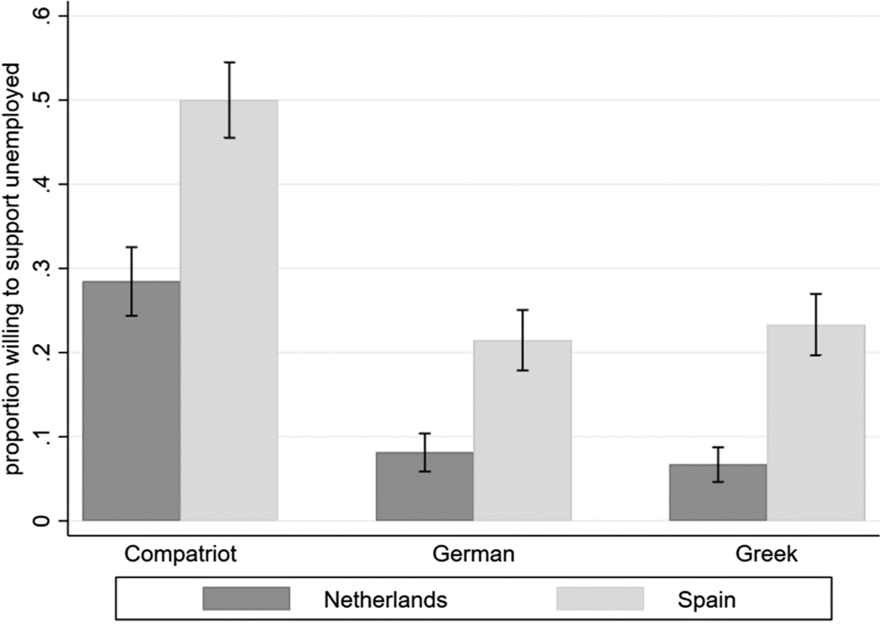
Figure 1. Fraction willing to help unemployed people by nationality of unemployed.
Table 1 shows results of a logit estimation, with willingness to make a sacrifice to help the unemployed as the dependent variable. We test whether respondents are more willing to help unemployed people in their own country than the unemployed abroad by including a dummy for whether respondents were in the national unemployment condition (coded 0) or in the EU unemployment condition (coded 1) as predictor variable. As Figure 1 revealed no significant differences in the answers in our German and Greek solidarity conditions, we decided to pool these in one ‘EU unemployment’ category. Because the treatment conditions were experimentally manipulated, their effects are exogenous to the characteristics of the respondents. Adjusting for age, gender, and education, the models show that both Spanish and Dutch respondents were significantly less willing to make a sacrifice for German or Greek unemployed people than for the unemployed in their own country (p < 0.01 for both populations and compared to either foreign recipient). This provides further empirical support for our first hypothesis that individuals are less willing to show solidarity towards unemployed people abroad than towards unemployed people in their own nation.
Table 1. Treatment effects on willingness to support unemployed people

Notes. Logit regression. Two-tailed test, *p < 0.05, **p < 0.01, ***p < 0.001.
One might argue that a greater willingness to support unemployed people in one’s own country rather than those abroad does not reflect solidarity but rather it suggests self-interest, as respondents may expect to eventually benefit from national unemployment policies themselves. We therefore conducted additional analyses in which we also controlled for respondents’ income and whether they were unemployed. Doing so did not substantially decrease the effect size nor significance for foreign recipients, and it did not increase the explained variance. Results hence support our overall argument and are shown in Table A3 in the appendix.
We now turn to hypotheses 2–5 relating to respondent characteristics. We again use willingness to support unemployed people as dependent variable and include a dummy for foreign recipients. We interact this with our variables of left-right ideology, European identity, immigration support, and education respectively. This allows us to disentangle respondents’ general willingness to support unemployed people from their willingness to help unemployed people of other member-states and to assess discrimination against foreign recipients.
Hypothesis 2 predicts that people with a more left-wing ideology are more supportive of assisting unemployed people in other European countries. The results presented in model 1 in Table 2 show that in the Netherlands, being more towards the left is significantly associated with greater support for the unemployed. However, the main effect of the foreign recipient remains strong and significant, while interaction effects for both left-right self-placement and inequality aversion are insignificant. This suggests that Dutch left-wing people, although more generous than right-leaning individuals, equally discriminate against foreigners (in the case of inequality aversion of the Netherlands, the interaction effect is trending towards significance at p = 0.53, which is why we plot the predicted probabilities shown in Figure 2). There is no direct association between left-right placement and support for unemployed people in Spain however, and the interaction terms remain insignificant.
Table 2. Effect of economic left-right ideology on willingness to support unemployed people
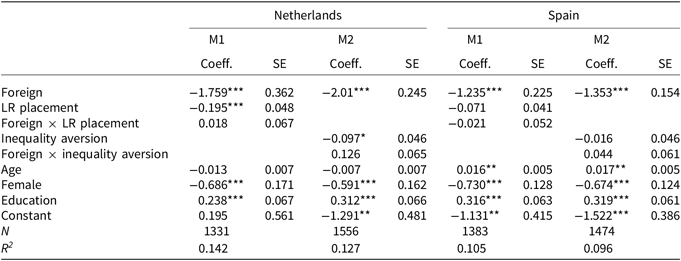
Notes. Logit regression. Two-tailed test, *p < 0.05, **p < 0.01, ***p < 0.001.
LR = left-right
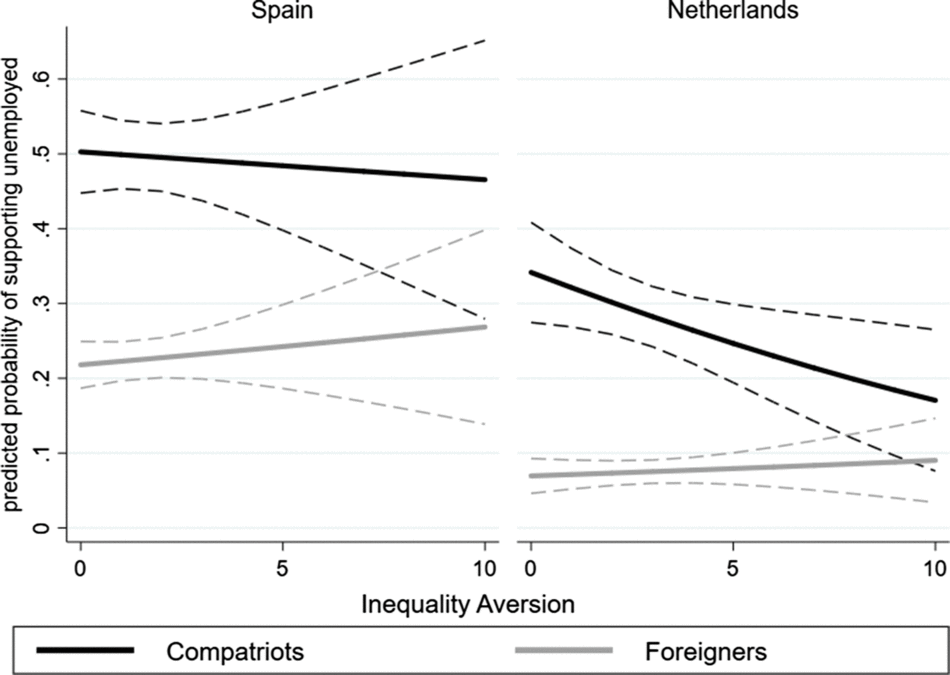
Figure 2. Predicted probabilities of supporting unemployed people by inequality aversion.
Figure 2 further illustrates the relationship between inequality aversion and solidarity with the unemployed by depicting the predicted probabilities of supporting unemployed people at home and abroad as inequality aversion increases. It confirms the results presented in Table 2 that left-right ideology has no influence on solidarity with unemployed people in Spain: Both probability slopes are near horizontal. A potential explanation could be that against the backdrop of the economic crisis, most people agreed that inequalities were too high in Spain (see Table A2 in the appendix), and support rates for unemployed people were generally high. In the Netherlands, inequality aversion did not influence the predicted probability of supporting unemployed people in another country, while it did increase the predicted probability of supporting unemployed people in one’s own country. People who disagreed that the differences between the rich and the poor are too large in the Netherlands did not treat unemployed people abroad and at home differently: towards both groups, they show very little solidarity. Taken together, these results suggest that in Spain left-right ideology does not play a role with respect to solidarity with unemployed people, while in the Netherlands, it is only related to solidarity with unemployed people in one’s own country and not to solidarity with the unemployed of other European member-states. We therefore reject hypothesis 2.
According to hypothesis 3a, people with a stronger European identity should show more solidarity towards the unemployed of other European countries. Table 3 shows that controlling for age, gender, and education, European attachment has a positive and direct effect on solidarity: People who feel more strongly attached to Europe are more supportive of helping unemployed people.Footnote 6 We also find a positive interaction effect for foreign recipient and European attachment, suggesting that European attachment significantly reduces the (still very strong and significant) foreigner penalty. However, given the relatively small effect sizes, European attachment cannot fully make up for this. In other words, individuals with higher European attachment seem to discriminate less, yet they do still discriminate against foreign recipients to some degree. In Spain, we find a significant direct effect of European attachment, but the interaction effect is insignificant. Hence, Table 3 provides some empirical support for hypothesis 3a for both countries, while hypothesis 3b finds no empirical support in Spain and only very weak support in the Netherlands.
Table 3. Effect of European attachment on willingness to support unemployed people

Notes. Logit regression. Two-tailed test, *p < 0.05, **p < 0.01, ***p < 0.001.
Figure 3 shows the predicted probabilities of supporting unemployed people in one’s own county compared with those in other member-states, by European attachment. The figure shows that general willingness to support unemployed people increases as levels of attachment increase. When comparing respondents with the highest level of European attachment to those with the lowest, we see that the former are significantly more likely to support unemployed people abroad, in line with hypothesis 3a. For hypothesis 3b to be supported, we should see overlapping confidence intervals (i.e. no significant difference in predicted probabilities) for the ‘compatriot’ and ‘foreigner’ slopes at higher levels of European attachment. In contrast, the figure shows that people are always more likely to support unemployed people at home than those abroad. In the Netherlands, the probability of supporting unemployed people abroad approximates the probability of supporting the unemployed of one’s own country as European attachment increases. In the Spanish sample however, the slopes for supporting the unemployed at home and abroad run almost parallel to each other. Hence, Figure 3 provides support for hypothesis 3a that European identity increases willingness to support unemployed people abroad, but there is no evidence in support of hypothesis 3b that European identity will limit discrimination towards foreign recipients.
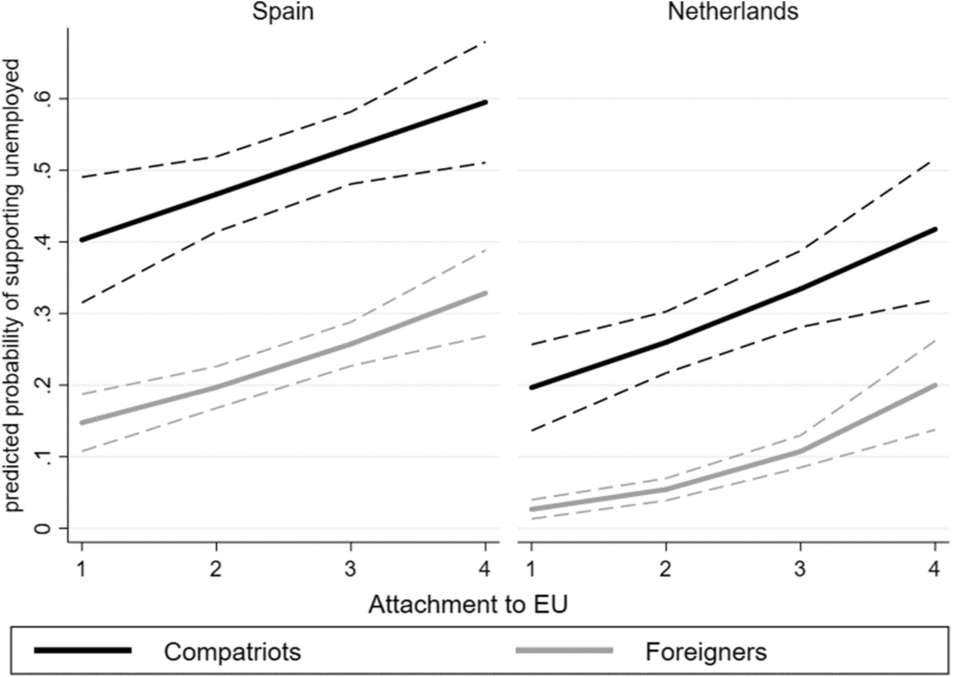
Figure 3. Predicted probabilities of supporting unemployed people by European attachment.
Table 4 shows that stronger agreement with the notion that there are too many immigrants in the Netherlands/Spain is negatively associated with support for the unemployed. While there is no significant interaction effect in the Netherlands, the interaction effect is significant in the Spanish sample. The probability plots in Figure 4 show that in both countries, the predicted probabilities of showing solidarity towards compatriots is higher than towards foreigners. In Spain, the predicted probabilities of supporting compatriots and foreign unemployed people start out at similarly high levels (with almost overlapping confidence intervals) and diverge the more people agree with the statement that there are too many immigrants. In the Netherlands, these probabilities decrease as immigration attitudes become more hostile – the predicted probability for supporting unemployed people abroad comes close to 0 at the anti-immigration extreme. These findings suggest that people who are more positive about immigration will be more likely to show solidarity towards unemployed people in other European countries, thus supporting hypothesis 4a. They also tend to discriminate less against foreign recipients, but they still prioritize the unemployed people of their own country above those abroad. This provides limited support for hypothesis 4b.
Table 4. Effect of immigration attitudes on willingness to support unemployed people

Notes. Logit regression. Two-tailed test, *p < 0.05, **p < 0.01, ***p <0.001.
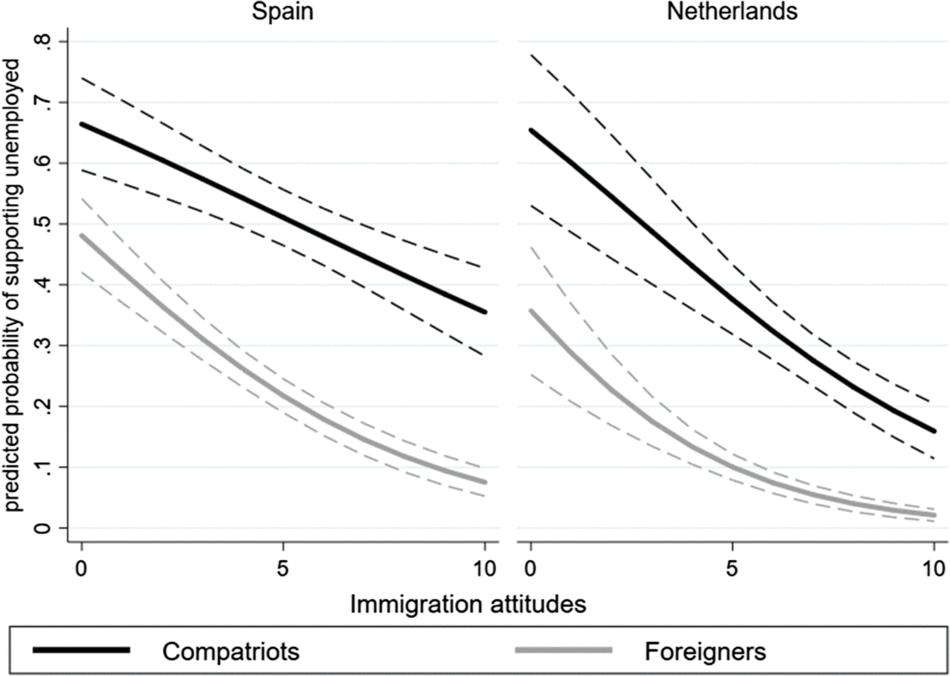
Figure 4. Predicted probabilities of supporting unemployed people by immigration support.
Next, according to hypothesis 5a, people with higher levels of education should show more solidarity towards unemployed people in other European member-states than do those with lower education levels. Our analyses presented in Table 5 suggest that this is indeed the case. We measure a respondent’s education with the highest educational degree obtained and interact this with the dummy accounting for national versus European unemployment condition. We see that both in Spain and in the Netherlands, there is indeed a positive direct effect of education on support for unemployed people, suggesting that higher levels of education increase solidarity with the unemployed. The interaction effects are insignificant, however. This means that while people with higher levels of education are more supportive of helping unemployed people both at home and abroad than do people with lower levels of education, this educational effect cannot make up for the negative effect of a foreign recipient – in other words, higher educated individuals are more supportive of helping unemployed people in general but still continue to discriminate against foreigners. Hence, people with higher levels of education are in absolute terms more willing to help unemployed Europeans, but this seems to be mainly due to their generally higher willingness to support unemployed people rather than a genuinely ‘cosmopolitan’ effect. Table A6 in the appendix shows additional analyses that control for income. In the Netherlands, the effect of education remains robust and income has no significant effect. In Spain, the coefficient of education becomes insignificant, while income has a significant and positive effect on support for unemployed people. This suggests that higher educated people in Spain are more supportive of helping unemployed people because they can afford to do so. It should be noted, however, that more than 20% of the Spanish respondents did not report their income.
Table 5. Effect of education on willingness to support unemployed people

Notes. Logit regression. Two-tailed test, *p < 0.05, **p < 0.01, ***p < 0.001.
Figure 5 provides further evidence. It shows the predicted probability of agreeing to support native and foreign unemployed people across all educational outcomes. While solidarity with unemployed people (both at home and abroad) increases with education (supporting hypothesis 5a), respondents of all educational levels are significantly more supportive of helping unemployed people in their own country than in other member-states (challenging hypothesis 5b).
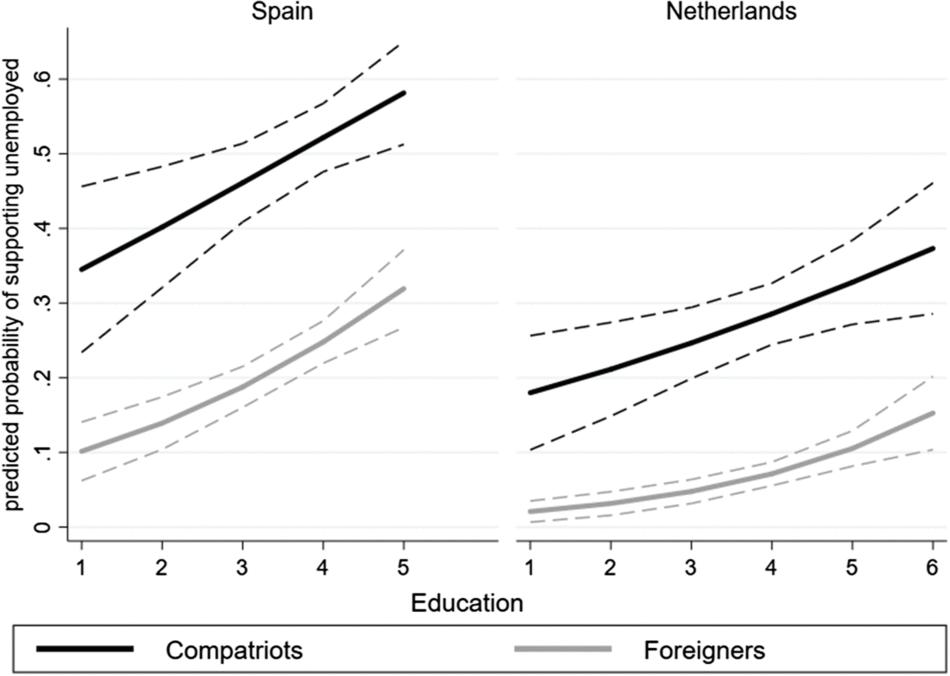
Figure 5. Predicted probabilities of supporting unemployed people by educational attainment.
Conclusion
The European sovereign debt crisis has triggered high levels of unemployment across the European Union (EU). At the same time, it has laid bare the fragile foundations of international solidarity in the EU. While the Europeanization of unemployment policy might seem more necessary than ever, it is also highly contentious. To what extent do citizens differentiate between solidarity to national versus European unemployed people, and who are the individuals most likely to overcome national boundaries of solidarity? This paper aimed to provide some answers to this question by analysing unique experimental survey data in Spain and the Netherlands. In a nutshell, we find strong and robust support for our expectation that solidarity is nationally bounded. Our results strongly suggest that Europeans show more solidarity towards unemployed people in their own country than towards foreigners. Even the people who are most likely to support unemployed people abroad – those with strong European identity, pro-immigration attitudes, and higher levels of education – prioritize their unemployed compatriots over the foreign unemployed. This being said, European attachment and immigration support by tendency narrows the gap in solidarity for both national and foreign unemployed people. Economic left-right ideology does not seem to play a role for international solidarity, which suggests that Europeans view international redistribution as distinct to national redistribution (Noël and Thérien, Reference Noël and Thérien2008).
Potential limitations of our study are that it involves only two countries and our conclusions cannot be generalized to the rest of the EU. However, a study on international solidarity across the 28 EU member-states finds very modest cross-country variation (Verhaegen, Reference Verhaegen2018). Moreover, Vandenbroucke et al., (Reference Vandenbroucke, Burgoon, Kuhn and Nicoli2018) find in a conjoint experiment across 13 countries that the citizens of countries most hit by the economic crisis (Italy, Spain, and Ireland) are most supportive of European unemployment risk sharing, while the most affluent countries in the study (including the Netherlands) are least supportive of such policies. This is in line with our findings and makes us confident that we have chosen two countries that represent opposite fates in the eurozone crisis.
It is interesting to note the differences between the results in Spain and the Netherlands. In the Netherlands, the left-right dimension is significantly correlated to supporting unemployed people in general but it plays no role at all in Spain. Moreover, in Spain, questions of collective identity play a weaker role than in the Netherlands. One reason for this might be that Spanish respondents generally showed more solidarity towards unemployed people at home and abroad, as indicated by the higher levels of support for our dependent variable. It is plausible that in the wake of the economic crisis in Spain, the difficulties unemployed people faced became evident to everyone. It may also be that Spanish respondents are more supportive of helping unemployed people in other European nations because they assume reciprocal support from other member-states in a situation in which their own welfare system struggles to sustain unemployed people. In any case, the differences between the Spanish and the Dutch results call for further cross-national research to allow us to analyse the impact of the national context on European solidarity.
While previous studies concluded that policymakers can count on widespread public support for European social policies (Gerhards et al., Reference Gerhards, Lengfeld and Häuberer2016, Reference Gerhards, Lengfeld, Ignacz, Kley and Priem2018), our findings suggest that the public basis of support is nonetheless rather weak when compared to support for national policies. Even those Europeans who are most likely to endorse European social policies still showed less solidarity for European unemployed than for the domestic unemployed. This being said, there is potential for increasing support for European unemployment policies in the long run. While collective identities develop at a much slower pace than institutions (Hooghe and Marks, Reference Hooghe and Marks2018), national welfare institutions have historically contributed to nation-building by providing essential services and by building imagined communities. It is hence plausible that, in the long run, European unemployment policies might create their own basis of support. Nonetheless, it does not seem feasible to fully Europeanize unemployment support. Rather, Ferrera’s (Reference Ferrera2017: 19) suggestion of ‘upholding and effectively nesting the institutional foundations of national social systems within the overall EU architecture’ seems a realistic and promising way forward (see also Vandenbroucke et al., Reference Vandenbroucke, Burgoon, Kuhn and Nicoli2018). An interesting avenue for future research will be to consider to what extent different features of European unemployment policies, such as the amount disbursed or conditions of receiving support, affect public support.
Acknowledgements
Theresa Kuhn gratefully acknowledges funding from the Netherlands Organization for Scientific Research (VENI Grant No. 451–13-029). Previous versions of this article were presented at the EPSA annual conference 2017 and at the EUSA biennial conference 2017. The authors would like to thank Florian Foos and Kostas Kourtikakis for helpful feedback. Isabella Rebasso and Haylee Kelsall provided excellent research assistance.
Supplementary material
To view supplementary material for this article, please visit http://doi.org/10.1017/S1755773919000067.

